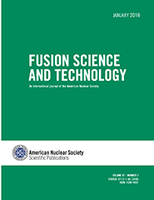
FUSION SCIENCE AND TECHNOLOGY
metrics 2024
Pioneering breakthroughs in fusion technology for a brighter tomorrow.
Introduction
FUSION SCIENCE AND TECHNOLOGY is a leading peer-reviewed journal published by Taylor & Francis Inc., dedicated to the advancement of knowledge in the fields of nuclear science, engineering, and fusion technology. With an impact factor that reflects its growing significance, this journal provides a platform for innovative research that addresses the challenges and opportunities within Civil and Structural Engineering, Materials Science, Mechanical Engineering, and Nuclear Energy and Engineering. Its open access option facilitates wider dissemination of groundbreaking research, enhancing visibility and accessibility for researchers, professionals, and students alike. As a member of the Q2 and Q3 Quartiles across various categories—demonstrating its reputable standing among peers—the journal plays a crucial role in fostering collaboration and sharing the latest scientific discoveries in fusion and related technologies from 2001 until 2024. This makes it an essential resource for anyone engaged in the multidisciplinary aspects of fusion science, contributing to the development of sustainable energy solutions.
Metrics 2024
 0.35
0.35 0.90
0.90 1.20
1.20 58
58Metrics History
Rank 2024
Scopus
IF (Web Of Science)
JCI (Web Of Science)
Quartile History
Similar Journals
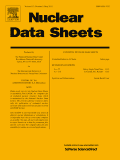
NUCLEAR DATA SHEETS
Empowering Researchers with Essential Nuclear Data.NUCLEAR DATA SHEETS is a premier journal published by Academic Press Inc. Elsevier Science, dedicated to advancing the field of nuclear and high-energy physics. With an impressive impact factor and a distinguished Q2 ranking in the pertinent category as of 2023, this journal is recognized for its significant contributions to the synthesis and dissemination of nuclear data, serving as an essential resource for researchers, professionals, and students alike. The journal has been in continuous publication since 1971, making it a cornerstone of knowledge in the discipline as it converges into 2024. Researchers can explore a plethora of meticulously curated articles that cover the latest findings, theoretical advancements, and experimental results in nuclear data, with the objective of fostering collaboration and innovation within the scientific community. While currently not open access, its publications are accessible through institutional subscriptions, ensuring a wide reach amongst academic and research institutions worldwide. With a high Scopus rank of #10 out of 87 in its field, NUCLEAR DATA SHEETS remains an authoritative source that is instrumental in shaping the future of nuclear physics research.
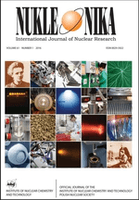
NUKLEONIKA
Fostering Collaboration in Interdisciplinary ResearchNUKLEONIKA, published by SCIENDO, is a leading open access journal that has been serving the scientific community since its establishment in 1968. Focused on the domains of Nuclear and High Energy Physics, Condensed Matter Physics, and Nuclear Energy and Engineering, this journal provides a platform for innovative research and technological advancements in a variety of interdisciplinary fields. With an impressive history of publications and a current Q3 ranking in several categories, including Safety, Risk, Reliability and Quality and Waste Management and Disposal, NUKLEONIKA is recognized for its significant contributions to scientific discourse. Open access since 2014, the journal ensures that all research outputs are freely available, facilitating broad dissemination and accessibility for researchers, professionals, and students alike. Located in the heart of Warsaw, Poland, NUKLEONIKA aims to inspire collaborative efforts and foster a deeper understanding of complex physical phenomena and their practical implications.
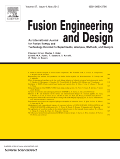
FUSION ENGINEERING AND DESIGN
Shaping the Landscape of Nuclear Energy and Engineering.FUSION ENGINEERING AND DESIGN is a premier scientific journal published by Elsevier Science SA, dedicated to advancing the field of fusion engineering, materials science, and related disciplines. Established in 1985 and running through 2024, this journal features cutting-edge research that spans multiple categories, including Civil and Structural Engineering, Mechanical Engineering, Materials Science, and Nuclear Energy and Engineering, holding a notable Q2 quartile ranking in each field as of 2023. Catering to a global audience of researchers and professionals, FUSION ENGINEERING AND DESIGN emphasizes the importance of interdisciplinary collaboration and innovative technology in tackling the complex challenges associated with fusion energy. Although it does not offer Open Access, the journal remains an essential resource for those seeking to stay abreast of developments that could shape the future of energy solutions and engineering methodologies. With a dedicated editorial board and a commitment to high-impact publication, this journal serves as a vital platform for disseminating transformative ideas and driving forward the scientific dialogue in fusion engineering.
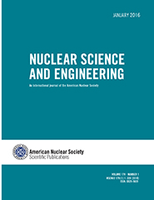
NUCLEAR SCIENCE AND ENGINEERING
Empowering Research in Nuclear Energy and EngineeringNUCLEAR SCIENCE AND ENGINEERING, published by Taylor & Francis Inc, is a leading journal in the field of nuclear energy and engineering, providing a vital platform for disseminating cutting-edge research and advancements from both academia and industry. With an ISSN of 0029-5639 and an E-ISSN of 1943-748X, the journal boasts a notable impact factor and is categorized in the Q2 quartile for 2023, reflecting its influence and quality in the field. Covering a comprehensive scope from the inception of nuclear technology in 1969 to contemporary advancements forecasted for 2024, it ranks #38 out of 77 in the Scopus Energy – Nuclear Energy and Engineering category, placing it in the 51st percentile. Although the journal is not open access, it remains essential for researchers, professionals, and students seeking to stay abreast of the latest developments and innovations in nuclear science. Located in the heart of Philadelphia, NUCLEAR SCIENCE AND ENGINEERING contributes significantly to the advancement of nuclear engineering knowledge and practice, making it a crucial resource for anyone involved in this dynamic field.
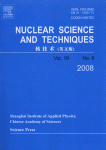
Nuclear Science and Techniques
Fostering Collaboration in the Nuclear CommunityNuclear Science and Techniques is a distinguished peer-reviewed journal published by Springer Singapore Pte Ltd, dedicated to advancing the fields of nuclear science and engineering. With an impressive impact factor reflected in its 2023 quartile rankings—Q2 in Nuclear and High Energy Physics and Q1 in Nuclear Energy and Engineering—the journal serves as a vital resource for researchers, professionals, and students alike. Covering a breadth of topics from nuclear physics to energy applications, it offers a platform for innovative research and developments in the nuclear domain. The journal, indexed under ISSN 1001-8042 and E-ISSN 2210-3147, aims to foster scientific exchange and collaboration within the community by publishing high-quality articles that contribute significantly to the field. Committed to maintaining an open-access ethos, it enhances visibility and accessibility of critical knowledge, making it an essential source for current insights and trends in nuclear science.
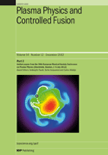
PLASMA PHYSICS AND CONTROLLED FUSION
Exploring the Boundaries of Plasma Physics and Fusion TechnologyPLASMA PHYSICS AND CONTROLLED FUSION is a leading academic journal published by IOP Publishing Ltd that focuses on advancing the understanding of plasma physics and its applications in the field of controlled fusion. Established in 1984, this prestigious journal has earned a significant reputation, demonstrated by its Q1 rankings in both Condensed Matter Physics and Nuclear Energy and Engineering for 2023, alongside impressive Scopus rankings placing it in the 79th percentile in its category. The journal serves as an essential platform for researchers, professionals, and students seeking to stay abreast of cutting-edge developments in plasma behavior, fusion technologies, and theoretical frameworks. While it does not currently offer open access options, the journal's rigorous peer-review process ensures the dissemination of high-quality research that is crucial for the advancement of nuclear energy solutions and the broader field of physics. With its commitment to fostering innovative research and development, PLASMA PHYSICS AND CONTROLLED FUSION is a vital resource for those passionate about the future of energy and scientific exploration.
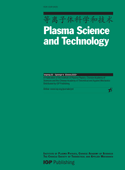
PLASMA SCIENCE & TECHNOLOGY
Pioneering Insights in Condensed Matter PhysicsPLASMA SCIENCE & TECHNOLOGY is a distinguished academic journal published by IOP Publishing Ltd, focusing on the realm of condensed matter physics. With its inception in 2000 and continuing through 2024, the journal serves as a vital platform for disseminating groundbreaking research and developments in plasma science, encompassing experimental and theoretical studies that advance our understanding of plasma behavior and its applications. Although the journal is not open access, its insights are invaluable for researchers, professionals, and students devoted to the intricate physics of plasmas, particularly given its respectable Q2 quartile ranking within its category as of 2023 and a notable Scopus rank that places it within the 44th percentile among its peers. Published from the United Kingdom, the journal aims to foster collaboration and innovation in this essential field of study.
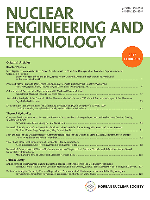
Nuclear Engineering and Technology
Exploring New Frontiers in Nuclear ScienceNuclear Engineering and Technology, published by the Korean Nuclear Society, is a premier Open Access journal dedicated to the rapidly evolving fields of nuclear energy and engineering. Established as a significant platform for scholarly communication since 2008, this journal has consistently anchored itself in the academic community, achieving a Q2 ranking in its category as of 2023, reflecting its influence and quality within the domain of Nuclear Energy and Engineering. With an impressive Scopus ranking of #15 out of 77, positioning it in the 81st percentile, the journal publishes cutting-edge research that addresses both fundamental and applied aspects of nuclear technology. Nuclear Engineering and Technology embraces an open access model since 2013, ensuring that valuable research is accessible to a global audience, thereby enhancing collaboration among researchers, professionals, and students passionate about advancing nuclear technology. The journal serves as an essential resource for those aiming to innovate and push the boundaries of knowledge in nuclear sciences.
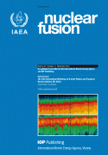
NUCLEAR FUSION
Pioneering insights into the dynamics of high-energy states of matter.NUCLEAR FUSION is a prestigious academic journal published by IOP Publishing Ltd, dedicated to advancing the field of nuclear and high-energy physics. With a significant impact factor and recognized among the top-tier journals, it boasts a Q1 ranking in both Condensed Matter Physics and Nuclear and High Energy Physics as of 2023. This journal, which has been published continuously since 1969, serves as a vital platform for researchers, professionals, and students exploring the latest advancements in fusion energy, plasma physics, and the intricate phenomena associated with high-energy states of matter. By disseminating original research, comprehensive reviews, and interdisciplinary studies, NUCLEAR FUSION strives to foster innovation and collaboration in pursuit of sustainable energy solutions, contributing significantly to the scientific community’s understanding of nuclear fusion processes. While the publication offers access options that enhance its reach, its rigorous peer-review process ensures the highest quality of scholarly communication.

ATOMIC DATA AND NUCLEAR DATA TABLES
Advancing knowledge in atomic and nuclear physics.ATOMIC DATA AND NUCLEAR DATA TABLES, published by Academic Press Inc Elsevier Science, is a leading journal in the fields of atomic and molecular physics, as well as nuclear and high energy physics. With an ISSN of 0092-640X and an E-ISSN of 1090-2090, this esteemed journal has been providing comprehensive data tables and significant research insights since its establishment in 1969. Spanning until 2024, it continues to serve as an invaluable resource for researchers and professionals aiming to deepen their understanding of atomic interactions and nuclear processes. Holding a commendable Q2 ranking in both relevant categories, it is recognized for its impact, reflected in Scopus rankings, where it ranks 25th out of 87 in Nuclear and High Energy Physics, and 87th out of 224 in Atomic and Molecular Physics. While it does not offer open access, the journal remains a crucial repository for high-quality data essential for scientific endeavors and advancements in these complex fields.